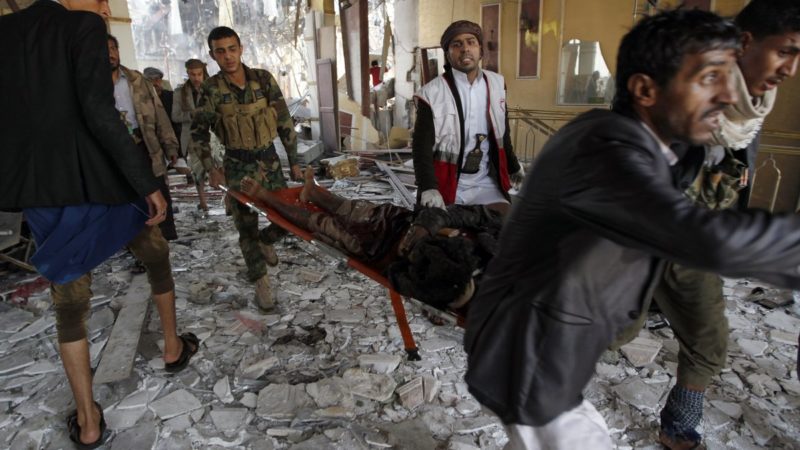
Labour’s frontbench is rightly highlighting the humanitarian crisis in Yemen today. But – as with so much else – we must decide whether we want to champion measures that could genuinely ease this horrendous situation or would rather fall in with anti-West posturing that would have a tragic, opposite effect.
The growing famine in Yemen, with up to 14 million going hungry according to the World Food Programme, has so far scarcely made it onto the radar of British people who feel surrounded with intractable problems, many far closer to home.
In recent weeks the country has mostly entered political debate on the lips of apparently left wing politicians and activists who use it to question the motives of others who are urging the government to do more to stop the systematic slaughter in Aleppo. This vapid whatabouttery was even espoused at the despatch box when shadow foreign secretary Emily Thornberry told her own MPs they were not allowed to “cry for Aleppo” unless they also supported Jeremy Corbyn’s desire for an arms embargo on Saudi Arabia, the principal military ally of the embattled Yemeni government.
Aside from the juvenility of suggesting you need a fully-stamped disaster pass card before being allowed to care, the sense that there is a symmetry of solutions is as wrong as advising British crowds to protest outside the US embassy rather than criticising Russia for its actions in Syria.
The situation in Yemen is indeed desperate.
The breakdown of the UN-brokered ceasefire in Yemen last week has plunged the country back into a terrible civil war that has already claimed thousands of lives. The ceasefire represented a real opportunity not just to stop the fighting but also to get vital humanitarian aid into the country. Many of the 14 million Yemenis who are short of food are trapped in areas that the war has made inaccessible. With many already suffering malnutrition, the risk of famine grows with every day the conflict continues.
In this context it is vital that the war is brought to an end as soon as possible, either by a negotiated peace or a victory for the international coalition against the attempted sectarian coup.
That was what all members of the UN Security Council agreed to work towards when they signed resolution 2116 last year. This gave the UK a clear obligation to support the legitimate government of Yemen against the violent attempted coup by Houthi extremists.
Yet, of course, we must all do this in compliance with international humanitarian law, which is why alleged battlefield abuses by Saudi armed forces are so important and worrying.
The devastating attack on a Yemeni funeral that killed up to 140 people was an outrage. While the internal investigation by the Saudis has found that this was an action carried out by an individual who broke official guidelines set for their military operations, the allegations are sufficiently serious to merit an independent UN-sponsored investigation to verify the facts and hold those responsible to account.
That part of our motion today is appropriate and right, yet it is wrongheaded in the extreme to go on to call for the UK government to withdraw its support for the Saudi-led military coalition seeking to defend the Yemeni government.
Why? Well, not least because the support we are giving is largely to help train pilots in targeting practices that reduce civilian casualties, trying to influence the Saudis into unambiguous compliance with humanitarian law. Showing your disapproval by removing the influence that can bring about change may give you a momentary buzz of self-satisfaction but is irresponsible and wrong. In this case it could well have the unintended consequence of making the deaths of Yemeni civilians even more frequent.
That is why the Yemeni ambassador has written to MPs to remind us that they welcome our support for the Saudi-led coalition and urge us to stand with the legitimate government in this conflict. And it is why Labour’s Keith Vaz, the chair of the APPG for Yemen is attempting to amend the motion today.
The various conflicts of the Middle East have made its politics deeply complicated and created a living nightmare for many of its citizens. It is right for Labour constantly to probe whether current strategies have the best chance of being effective. We must apply constructive opposition not least because of the impact the region’s turmoil has on the streets of Britain – both in the refugee crisis and harbouring the poisonous ideologies that is creating terrorists determined to do us harm.
But the test must always be whether the action we propose has a chance of being effective.
The last thing the Middle East needs is more gesture politics from the comfort of British dining tables and withdrawal by those who have the capacity to play a constructive role.
John Woodcock is MP for Barrow and Furness and chair of the Parliamentary Labour Party’s Defence committee




More from LabourList
‘Tackling poverty should be the legacy of Keir Starmer’s government’
‘The High Court judgment brings more uncertainty for the trans community’
‘There are good and bad businesses. Labour needs to be able to explain the difference’